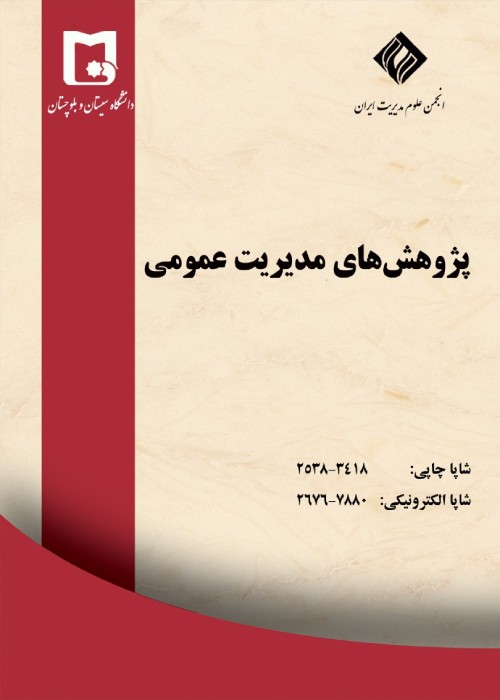Impact of Social Capital on Psychological Empowermen with the Role of Mediating Intellectual Capital
Abstract Empowering employees as an important structure can play a crucial role in the effectiveness of the organization. In the psychological approach to empowerment, the theory of social cognition is based. This theory provides a useful framework for analyzing the feelings of individuals from their level of ability. The present study was conducted to investigate the effect of social capital on psychological empowerment with the role of mediator of intellectual capital. The research is based on the purpose of the research and the method of collecting data is a descriptive correlation. Data was collected using library surveys. Questionnaires were used to collect the data from the Nahapiet & Ghoshal (1998), Bontis intellectual capital (1998) and Spritzer psychological empowerment questionnaires (1995). The statistical population of the study consisted of all nurses of Khatam-Al-Anbia hospital in Zahedan with 250 people. According to Morgan table, 150 people were selected as sample. To determine the reliability of the questionnaires, Cronbach's alpha and combined reliability were used. The rate for all three questions was higher than .7. The values obtained for convergent and divergent validity also indicated validity of questionnaires. Data analysis was performed using SPSS and SMART PLS software. The results of the assumptions test showed that social capital has a positive and significant effect on the psychological empowerment of nurses at Khatam Al-Anbia hospital in Zahedan through the mediator of intellectual capital. Also, among dimensions of social capital, trust has the most impact (0.38) on nurses' psychological empowerment. Introduction Today, rapid environmental changes, global competition and new demands for quality services, require quick response from organizations. In order to overcome the uncertain, complex and dynamic conditions, the only way forward is to empower employees through the acquisition of knowledge and skills that quickly become obsolete. The empowerment of employees as an empowerment of employees for decision making is also described. By employing empowerment techniques, employees feel trust, double-duplicate, commitment and self-reliance. In general, three approaches, Relation, Motivational and Psychological In empowerment. The psychological empowerment is the process of promoting self-esteem and internal motivation among employees. This approach provides a useful framework for analyzing the feelings of individuals from their capacity levels. Intellectual capital is one of the factors that can be effective in empowering employees. Intellectual capital is invisible capital. And includes a set of knowledge, information, intellectual property, experience, competition and organizational learning. Intellectual capital consists of three components of human capital, structural and communication. Various researches have been done on the factors influencing intellectual capital, according to which, among other factors, factors affecting intellectual capital are social capital. Social capital promotes the norms and values within the organization. The main idea of social capital is membership in networks that make it possible to participate in mutual benefit. The amount of social capital that a person has, depending on the size of his communications network. Considering the importance of these networks and its role in the exchange and interaction of information in organizations, especially hospital units, it is necessary to pay attention to the social capital variable and its consequences, including empowerment of employees. Competition between hospitals has expanded today, treatment costs require patients to be in a better position to serve. Certainly, hospitals with more powerful human resources will be able to better respond to their clients. Therefore, the present research seeks to investigate the effect of social capital variable on empowerment of employees with the mediating role of variable intellectual capital in nurses of Khatam Al-Anbia hospital in Zahedan. Case study The statistical population of the study consisted of all nurses of Khatam-Al-Anbia hospital in Zahedan with 250 people. According to Morgan table, 150 people were selected as sample. Research Methods The purpose of this study was with investigate the Impact of Social Capital on Psychological Empowermen with the Role of Mediating Intellectual Capital. The statistical population of the study consisted of all nurses of Khatam-Al-Anbia hospital in Zahedan with 250 people. According to Morgan table, 150 people were selected as sample. To determine the reliability of the questionnaires, Cronbach's alpha and combined reliability were used. The rate for all three questions was higher than .7. The values obtained for convergent and divergent validity also indicated validity of questionnaires. Data analysis was performed using SPSS and SMART PLS software. Discussion and Results The results of the assumptions test showed that social capital has a positive and significant effect on the psychological empowerment of nurses at Khatam al-Anbia hospital in Zahedan through the mediator of intellectual capital. Also, social dimension of social trust has the most impact (0.38) on nurses' psychological empowerment. Conclusion Empowering employees as an important structure can play a vital role in the organization's innovation and effectiveness. Therefore, research on the factors and obstacles to empowerment is of great importance. In the psychological approach to empowerment, the theory of social cognition is based. This theory provides a useful framework for analyzing the feelings of individuals from their level of ability. The purpose of this study was with investigate the Impact of Social Capital on Psychological Empowermen with the Role of Mediating Intellectual Capital. The results of the study showed that social capital has a positive and significant effect on the psychological empowerment of nurses at Khatam-Al-Anbia Hospital in Zahedan via the mediating variable of intellectual capital. According to the findings of the research, the following suggestions are presented: 1: Encouragement and strengthening of social and professional institutions; 2: Planning for the enrichment of the social culture of the hospital; 3: Attention to the promotion of social capital in public education and nursing education; 4: Attempting to fulfill the ethics at the level of individuals, groups, and sector
- حق عضویت دریافتی صرف حمایت از نشریات عضو و نگهداری، تکمیل و توسعه مگیران میشود.
- پرداخت حق اشتراک و دانلود مقالات اجازه بازنشر آن در سایر رسانههای چاپی و دیجیتال را به کاربر نمیدهد.


